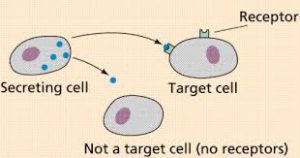What Is a Hormone?
 A hormone is a chemical messenger which moves through the bloodstream, potentially affecting every cell of the body. Different hormones are produced by different glands. They can be fast or slow acting and help to maintain a constant environment inside the body, despite outside changes. Hormonal secretions can be rhythmic, tied to the solar and lunar cycles, instantaneous, or active over very long periods of time, such as the action of growth hormone throughout childhood.
A hormone is a chemical messenger which moves through the bloodstream, potentially affecting every cell of the body. Different hormones are produced by different glands. They can be fast or slow acting and help to maintain a constant environment inside the body, despite outside changes. Hormonal secretions can be rhythmic, tied to the solar and lunar cycles, instantaneous, or active over very long periods of time, such as the action of growth hormone throughout childhood.
Hormones are able to act by binding to particular receptors in or on the cells of their target tissues. The receptor has an affinity for that particular hormone and for substances that mimic that hormone, such as phytoestrogens, xenoestrogens and metalloestrogens. The hormone then affects the cell nucleus to create a specific protein, which acts as an enzyme with a characteristic action. The action causes a shift in the body’s metabolism.
The collective actions of glands and hormones is termed the endocrine system. The function of the endocrine system is profoundly affected by what we feel and think, as well as by the environment around us and by what we put into our bodies as food and drink. Today more than ever before, environmental chemicals, radiation, electromagnetic fields, and contaminants in food are disrupting our hormones.
Hormones work in concert. Like musicians in an orchestra, they are dependent upon one another to produce the music that sings through the body. Any imbalance in one hormone is likely to make the whole symphony sound out of tune.
Causes of Hormonal Imbalances
Many women’s ailments are linked to specific hormonal imbalances, which can be triggered by any one or a combination of the following. Mark an X in any of the factors that you are aware are true for you:
- Stress and overexertion
- Not enough time for relaxation and play
- Improper breathing
- Improper diet – excess saturated or hydrogenated fat, sugar, refined carbohydrates, meat, dairy
- Nutritional deficiencies – such as vitamins B5, B6 and C, zinc, selenium, magnesium, tyrosine, tryptophan, essential fatty acids
- Food sensitivities
- Environmental allergies
- Infectious organisms and/or imbalance in intestinal flora
- Intestinal toxins, such as yeast toxins
- Impaired liver function or liver stagnation
- Obesity and elevated blood sugar
- Excess alcohol, coffee
- Smoking
- Exposure to strong electromagnetic fields or dirty power
- Radiation exposure
- Environmental chemicals including PCBs, dioxin, pesticides, phthalates, bisphenol A, PVC, fire retardants, parabens in cosmetics
- Exposure to hormone-disrupting chemicals or hormonal excess in utero
- Pharmaceutical drugs, birth control pill, hormone replacement therapy
- Heavy metals, particularly cadmium, mercury and lead
- Lack of exercise or excessive exercise
- Exposure to light at night
- Shift work
- Insomnia
- Obesity or being underweight
- History of emotional trauma or abuse
- Thought patterns and emotions
- Imbalances in the chakras
- Organ disharmonies, blood deficiency or yin and yang imbalances
For many of the above imbalances you can seek help from a naturopathic doctor, nutritionist or other health care provider.What three things can you do to bring your hormones back into balance? Share on our Facebook page.



